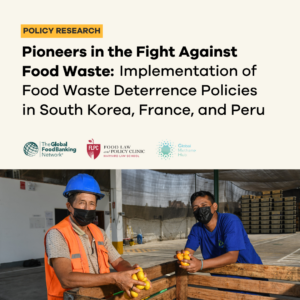This article was originally written by Eve Gleeson and published by FoodTank on July 25, 2021.
Recent research from the Harvard Law School Food Law and Policy Clinic (FLPC) and The Global FoodBanking Network (GFN) illustrates the diversity of food donation and waste issues around the world and proposes policy options for addressing these challenges.
The project, known as The Food Donation Policy Atlas, provides insight into food waste issues across governance systems, cultures, and geographies. The FLPC and GFN most recently published findings on Chile, Colombia, Guatemala, Peru, Singapore, South Africa, and the United Kingdom (UK). The organizations hope this research will illuminate barriers to food donation in these countries and help the regions develop better food donation and waste policies.
According to the United Nations, around 1.3 million tons of food– roughly one third of all food that is produced– go to waste every year. At the same time millions of people around the world still lack access to sufficient and nutritious food. The Atlas research indicates that food donation, which could address waste and hunger issues, can be partly addressed through better government policies.
The Atlas aims to provide “a menu of policies, some of which cost money, like grants or tax incentives, and some of which simply require government guidance,” Emily Broad Leib, Director of FLPC, tells Food Tank.
This recent research finds that food donors, such as restaurants and supermarkets, may struggle to understand existing food donation policies. If these policies are confusing or nonexistent, businesses may be reluctant to donate.
The report also recommends that governments remove financial barriers associated with food donation. Many countries covered in the latest reports do not offer monetary incentives. But GFN and FPLC believe that removing VAT expenses or awarding tax credits for donations can encourage food donations.
The Atlas’ other recommendations include standardized expiration labels, better food safety procedures, donation requirements or penalties, and government grants.
While countries can benefit from similar recommendations, the Atlas also underscores some important policy differences. For example, the UK is the only country with a dual date-labelling system, providing both a best by date and a safe until date. This is essential, the Atlas proposes, for saving food even when it is no longer at peak quality. It is also the only country that provides grants and incentives for food donation.
Singapore’s government stands out for its thorough governance on food safety standards of donated food. Singapore’s supply chain and hygiene regulations reassure both donors and recipients that donated food is safe to eat. On the other hand, Singapore must prioritize minimizing food waste due to its dependence on imported food and limited space for landfills.
Regardless of country-specific policies, the Atlas recommends that all governments and community-based groups prioritize transparency, communication, and collaboration.
Policy reform in this area requires government action, explains Emily Broad Leib. Governments have, or should have, a vested interest in addressing food donation and waste issues, she states.
Local organizations also have an important role to play. “National policies can establish country-wide goals, best practices, [and] resources… while community-based organizations can offer on-the-ground expertise, implementation planning, [and] relationships with local food producers and consumers,” Broad Leib tells Food Tank.
The FLPC and GFN have published research on fourteen countries in total. You can access this research on the Atlas’ library.


Health Law & Policy, Commentary
2025: The View from the State Level – Health Care in Motion
February 12, 2025